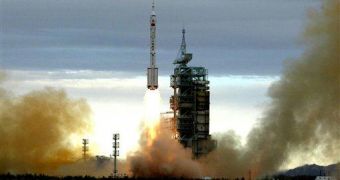An official from the Chinese Space Administration declared that the first step in Moon exploration will take off later this year. It's a Moon orbiter, part of an ambitious Chinese space exploration plan.
The country's lunar ambitions are set out in the "Chang'e Project," named after the Chinese moon goddess. It comprises three stages through 2017.
The next one will be a remote-controlled lunar rover likely to take off in 2012 and an unmanned return module, in a few years. The plan for the third phase was for another rover to land on the lunar surface and collect samples before returning to Earth, said Sun. The three phases are officially called "circling the moon," "landing on the moon" and "back to earth."
"The moon probe project is the third milestone in China's space technology after satellite and manned spacecraft projects, and a first step for us in exploring deep space," said Sun Laiyan, chief of the China National Space Administration.
China is the third country, after the United States and the former Soviet Union, to put an astronaut in space in a space shuttle "Made in China," in 2003.
"Space technology reflects a nation's overall power and is an important facet of the modernization of national defense," Sun said.
He also declared, while speaking to students at Beijing Jiaotong University, that China is able to produce and launch home-made ground-to-ground, air defense and coastal defense missiles. Moreover, he stated that China also has an impressive nuclear arsenal as a key component of the national defense.
"As late Chinese leader Deng Xiaoping pointed out, if China had no atomic bombs or hydrogen bombs and had not launched its first satellite since the 1960s, China could not be called an influential country and would not enjoy the same international status,'' he said.

 14 DAY TRIAL //
14 DAY TRIAL //